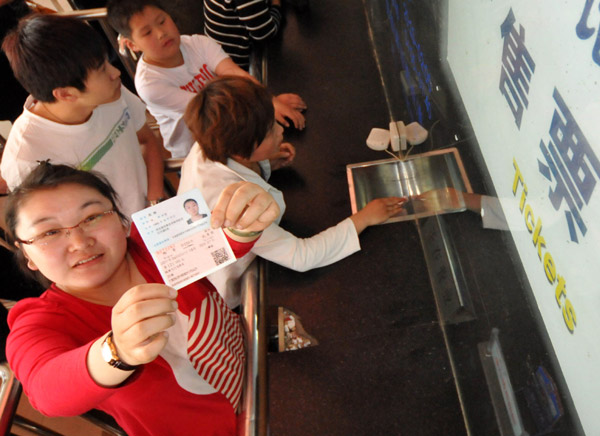Beijing starts real-name train ticket sales
Passengers who want to ride high-speed trains on June 1 or after will find themselves having to pay attention to a new ticketing system adopted by railway authorities.
 |
|
Wu Lin displays her ID card and a train ticket, which she bought after showing her ID card to the worker at the railway station in Xingtai city, Hebei province, on Sunday. |
A real-name ticket sales system began operation Sunday in Beijing. The new policy, designed for EMU trains which include D-trains, G-trains and C-trains, aims to make buying a ticket more convenient and fair, by foiling scalpers.
At the southern railway station of Beijing, travelers have begun to use a ticket vending machine particularly installed with an ID card reader. A young passenger who has bought a ticket for the Beijing-Tianjin Intercity Rail said he believes the new system will facilitate ticket purchase for ordinary passengers during the travel peak.
"Without the name-based ticket sale system, ticket purchase at the travel peak season is particularly difficult. I think the new rule will alleviate traffic congestion and foil scalper gangs selling tickets at unreasonably high prices."
However, he thought it unnecessary to use an ID card for the purchase of train tickets during the off-peak travel season.
"Sometimes, we might forget bringing our ID cards. I think it's fine and enough for the travel peak season. In normal times, the new rule might cause unnecessary trouble."
Yu Xuejin is the publicity official for the railway station. He said passengers who forget or lose their ID cards can go to a special window opened by local police authorities to get temporary ID cards before buying a ticket.
Meanwhile, besides ID cards, student certificates, military service cards, and passports have all been included into the over 20 different kinds of identification which have been approved by the Ministry of Railways for the real-name system.
On the other hand, Yu Xuejin warned travelers of a possible information leaks as a result of name-based ticket sale.
"Personal information will be on the name-based ticket. Passengers shouldn't throw away their tickets randomly after the trip. If they do, a possible leak of personal information could occur."
In order to pave way for the new policy, Yu Xuejin said ticket vending machines with ID card readers have been installed at the railway station. The railway station has completed a special training session for more than 500 ticket salespeople, which includes staff members at the authorized ticket offices outside the railway station.
A staff member working in an authorized ticket office coded "West A018" located in eastern Beijing said their office has now been equipped with an ID card reader. Travelers who intend to buy tickets on June 1st have to provide their ID cards. Without an ID card, the office can't sell any tickets.
Regarding the new rule's inconvenience, the staff worried that the name-based ticket system might breach passengers' privacy.
"It's hard to evaluate the new policy's advantages and disadvantages. It's definitely conducive to railway system's management; however, passengers would feel they have no privacy any more."
The new policy, which took effect on Sunday, will set a precedent for passengers who plan to travel on June 1st, since Beijing has a ten-day presale period.
According to the policy, the new booking system means a passenger who takes the same train at the same station on a given day can only purchase one ticket with a nationally recognized form of personal identification.
 0
0 






